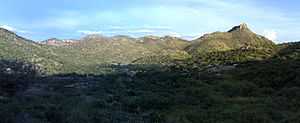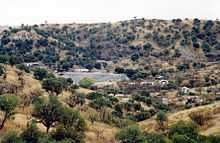Ruby, Arizona
| Ruby, Arizona | |
|---|---|
| Ghost Town | |
 | |
 Ruby, Arizona | |
| Coordinates: 31°27′40″N 111°14′15″W / 31.46111°N 111.23750°WCoordinates: 31°27′40″N 111°14′15″W / 31.46111°N 111.23750°W | |
| Country | United States |
| State | Arizona |
| County | Santa Cruz |
| Elevation[1] | 4,186 ft (1,276 m) |
| Time zone | MST (no DST) (UTC-7) |
| Post Office Opened: | April 11, 1912 |
| Post Office Closed: | May 31, 1941 |
Ruby is a ghost town in Santa Cruz County, Arizona, United States. It was founded as a mining town in Bear Valley, originally named Montana Camp, so named because the miners were mining at the foot of Montana Peak.
History

Mining started around 1877. The Montana Mine produced gold, silver, lead, zinc and copper. At its peak in the mid-1930s, Ruby had a population of about 1,200.[2]
On April 11, 1912 the mining camp's general store owner Julius Andrews established the post office. Andrews named the post office "Ruby" after his wife Lille B. Ruby Andrews, and the mining camp soon became known as Ruby. The post office was discontinued on May 31, 1941.[3]
Between 1920 and 1922, the town of Ruby, or the desert nearby, was the scene of three gruesome double homicides committed by Mexican rebels or bandits. Together these incidents are known as the Ruby Murders, which led to the largest manhunt in the history of the Southwest.[4]
The most prosperous period for Ruby was in the late 1920s and 30s, when the Eagle-Picher Mining Company operated the mine and upgraded the camp. From 1934 to 1937, the Montana mine was the leading lead and zinc producer in Arizona. In 1936, it was third in silver production. The mine closed in 1940, and by the end of 1941 Ruby was abandoned.[2]
Ruby is one of the two best-preserved mining ghost towns in Arizona, along with the Vulture Mine near Wickenburg, Arizona. Ruby's attractions today include about 25 buildings under roof, including the old jail and houses, the old school, the playground, old mine machinery, buildings and mine workings. Ruby is entirely on private property and there is a charge for admission to the site.[2]
There are occasional public tours offered through Pima Community College.[5]
See also
References
- ↑ U.S. Geological Survey Geographic Names Information System: Ruby
- ↑ 2.0 2.1 2.2 Philip Varney, 1994, Arizona ghost towns and mining camps. Arizona Highways books, ISBN 0-916179-44-3
- ↑ Granger, Byrd H. (1970) Arizona Place Names, pp. 323-324, Tucson, Arizona: University of Arizona Press, ISBN 8165-0009-6
- ↑ "Ruby, Arizona - A Ghost Town Filled With Mining and Murder". Legends of America.
- ↑ Pima College ST-210
Further reading
- Ring, Al, et al.(2005) Ruby, Arizona: Mining, Mayhem, and Murder. Tucson: U.S. Press and Graphics, 2005.
External links
| ||||||||||||||||||||
